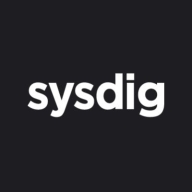

Sysdig Secure and Azure Kubernetes Service (AKS) are solutions in container security and Kubernetes management. Based on user reviews, while Sysdig Secure is favored for its comprehensive security features, AKS is preferred for its integration and scalability.
Features: Sysdig Secure offers advanced runtime security, compliance checks, and threat detection capabilities. AKS provides seamless integration with Azure services, ease of use for container orchestration, and enhanced scalability.
Room for Improvement: Sysdig Secure needs to simplify its initial setup, enhance documentation, and streamline deployment processes. AKS could improve monitoring capabilities, cost management, and expand feature sets tailored to user needs.
Ease of Deployment and Customer Service: Sysdig Secure has a challenging deployment process that often requires significant support. AKS offers a smoother deployment experience and strong customer support from Microsoft.
Pricing and ROI: Sysdig Secure has high setup costs but offers significant ROI due to its robust security benefits. AKS provides cost-effectiveness and substantial ROI from operational efficiencies through its seamless integration with Azure services.
| Product | Market Share (%) |
|---|---|
| Sysdig Secure | 2.7% |
| Azure Kubernetes Service (AKS) | 0.8% |
| Other | 96.5% |


| Company Size | Count |
|---|---|
| Small Business | 15 |
| Midsize Enterprise | 7 |
| Large Enterprise | 22 |
| Company Size | Count |
|---|---|
| Small Business | 5 |
| Midsize Enterprise | 2 |
| Large Enterprise | 3 |
Azure Kubernetes Service (AKS) is a fully managed container orchestration service provided by Microsoft Azure. It simplifies the deployment, management, and scaling of containerized applications using Kubernetes. With AKS, developers can focus on building applications while Azure takes care of the underlying infrastructure. It offers features like automatic scaling, monitoring, and security, ensuring high availability and reliability. AKS integrates seamlessly with other Azure services, enabling easy integration with existing workflows. It also provides a flexible and open-source environment, allowing developers to use their preferred tools and frameworks. With AKS, organizations can accelerate their application development and deployment processes, while reducing operational overheads.
In the cloud, every second counts. Attacks move at warp speed, and security teams must protect the business without slowing it down. Sysdig stops cloud attacks in real time, instantly detecting changes in risk with runtime insights, a unique AI architecture, and open source Falco. Sysdig delivers live visibility by correlating signals across cloud workloads, identities, and services to uncover hidden attack paths. By knowing what is running, teams can prioritize the vulnerabilities, misconfigurations, permissions, and threats that matter most. From prevention to defense, Sysdig helps enterprises move faster and focus on what matters: innovation.
Sysdig. Secure Every Second.
We monitor all Container Security reviews to prevent fraudulent reviews and keep review quality high. We do not post reviews by company employees or direct competitors. We validate each review for authenticity via cross-reference with LinkedIn, and personal follow-up with the reviewer when necessary.